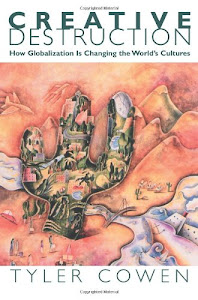
Creative Destruction: How Globalization Is Changing the World's Cultures
Catégorie: Livres pour enfants, Érotisme, Romans et littérature
Auteur: Nick Loper, John McCrea
Éditeur: Peter Wohlleben, John Soars
Publié: 2016-09-07
Écrivain: Kim Krans
Langue: Vietnamien, Hongrois, Hébreu, Croate
Format: epub, eBook Kindle
Auteur: Nick Loper, John McCrea
Éditeur: Peter Wohlleben, John Soars
Publié: 2016-09-07
Écrivain: Kim Krans
Langue: Vietnamien, Hongrois, Hébreu, Croate
Format: epub, eBook Kindle
The Conflicts of Globalization - Charles O. Lerche III ... - The particular difficulty faced by moderns is that this knowledge itself is constantly changing so that living in a ... In the real world, losers are people, sometimes capitalists, but always workers, individually and as communities. Creative destruction means the unemployment of real workers, the destitution of real communities, devastation of the environment, and disempowerment of the ...
Dimensions of globalization - Wikipedia - Economic globalization is the intensification and stretching of economic interrelations around the globe. It encompasses such things as the emergence of a new global economic order, the internationalization of trade and finance, the changing power of transnational corporations, and the enhanced role of international economic institutions. ...
4 Conclusions and Recommendations | Globalization ... - Globalization, Biosecurity, and the Future of the Life ... on which our biodefense research and development activities are so strongly focused today are just one aspect of this changing landscape of threats. Although some of them may be the most accessible or apparent threat agents to a potential attacker, particularly one lacking a high degree of technical expertise, this situation is likely ...
Creative destruction - Wikipedia - Creative destruction (German: schöpferische Zerstörung), sometimes known as Schumpeter's gale, is a concept in economics which since the 1950s is the most readily identified with the Austrian-born economist Joseph Schumpeter who derived it from the work of Karl Marx and popularized it as a theory of economic innovation and the business cycle.
Friedrich Nietzsche - Wikipedia - Friedrich Wilhelm Nietzsche (/ ˈ n iː tʃ ə, ˈ n iː tʃ i /; German: [ˈfʁiːdʁɪç ˈvɪlhɛlm ˈniːtʃə] or [ˈniːtsʃə]; 15 October 1844 – 25 August 1900) was a German philosopher, cultural critic, composer, poet, writer, and philologist whose work has exerted a profound influence on modern intellectual history. He began his career as a classical philologist before turning to ...
Iran - Wikipedia - Iran (Persian: ایران Irān [ʔiːˈɾɒːn] ()), also called Persia, and officially the Islamic Republic of Iran, is a country in Western is bordered to the northwest by Armenia and Azerbaijan, to the north by the Caspian Sea, to the northeast by Turkmenistan, to the east by Afghanistan, to the southeast by Pakistan, to the south by the Persian Gulf and the Gulf of Oman, and ...
Compendium of the Social Doctrine of the Church - It is the same Spirit of the Lord, leading the people of God while simultaneously permeating the universe[63], who from time to time inspires new and appropriate ways for humanity to exercise its creative responsibility[64]. This inspiration is given to the community of Christians who are a part of the world and of history, and who are therefore open to dialogue with all people of good will in ...
Globalization and Free Trade - Foundation for Economic ... - Globalization and Free Trade. Free Trade Is the Path to a Bright Economic Future Thursday, April 1, 2004 . Richard M. Ebeling. Free Trade Collectivism. Download: ftp0404 Freedom of trade is really a very simple concept. Each individual should be at liberty to buy from and sell to whomever he wishes on mutually agreed-upon terms. Whether the partners to this trade live next door to each other ...
Evangelii Gaudium : Apostolic Exhortation on the ... - Evangelii Gaudium, Apostolic Exhortation of Pope Francis, 2013. 1. The joy of the gospel fills the hearts and lives of all who encounter Jesus. Those who accept his offer of salvation are set free from sin, sorrow, inner emptiness and loneliness.
Economic history of the United States - Wikipedia - Historians have debated whether or not the Civil War sped up the rate of economic growth in the face of destruction throughout the South and the diversion of resources to military supplies and away from civilian goods. In any case the war taught new organizational methods, prioritized engineering skills, and shifted the national attention from politics to business.
[pdf], [goodreads], [free], [audiobook], [read], [english], [epub], [download], [audible], [kindle], [online]


















0 komentar:
Posting Komentar
Catatan: Hanya anggota dari blog ini yang dapat mengirim komentar.